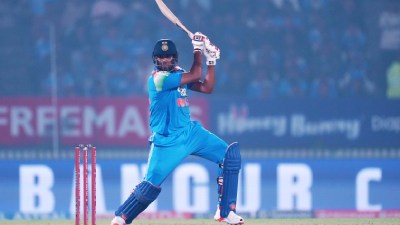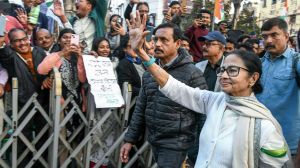Hegemony, uninterrupted
As India heads for another parliamentary election it may be useful to look at the politics of caste. The last six years of the BJP8217;s ru...

As India heads for another parliamentary election it may be useful to look at the politics of caste. The last six years of the BJP8217;s rule have seen the forces of Hindutva consolidating their control over institutions of Hindu spiritualism, business and education. The only problem
they have faced is in handling the question of caste, as both Hinduism as religion and Hindutva as political ideology have, over centuries, nurtured and sustained caste and the hegemony of the brahminical forces in all spheres of life. From temple priesthood to prime ministership, brahminical forces have handled all the positions of power.
At the same time, Ambedkarite Dalit movements and the Mandal agenda brought the ideology of caste to the fore, something that a party with a strong Hindu orientation found a hard nut to crack. Indeed, until L.K. Advani, a non-Brahmin and a migrant from Pakistan, emerged as a leader within the BJP, even the party leadership was totally dominated by the upper castes. In the recent past, the BJP has experimented with numerous caste manoeuvres 8212; with Kalyan Singh, with Shankarsinh Vaghela, as well as a partnership with Mayawati. It has been forced by the power equations to grant some positions of authority to Dalits, tribals and OBCs.
In other words, democracy and the right to vote is carving out a space for the new social forces even within the Hindutva ranks. Indeed, the new trend within the Hinduised Shudra-OBC social forces is to push for a more militant Hindu agenda, so as to use their muscle power to occupy the centrestage of electoral politics. Narendra Modi set his own example by constructing a socio-political space out of riots against Muslims.
What8217;s interesting about this process is that the SC/ST and OBC communities are increasingly coming to occupy the political space Muslims had occupied earlier. What appears as a gain in socio-political terms for the Shudra-OBCs is the space the Muslims have lost after Independence. In this churning, the brahminical forces have not lost anything. In fact, at the all-India level, they have expanded their presence in both the public and private sectors, both within the bureaucratic and non-bureaucratic spheres.
The shift from the public sector to the private sector in the realm of industry has boosted their economic and political presence and their social resource base. NRI inputs have increased their wealth base hugely. Similarly, in the realm of electoral politics, what appears to be a visible space of OBCs and upper layer of Shudras is not essentially a representative space. The most powerful space continues to remain in the hands of brahminical forces. They handle the levers of power and manipulate them in such as way as to ensure that the structures operate in their favor. The key ministries are placed in the hands of very ideological Hindutva elements8212; Murli Manohar Joshi is a good example 8212; in the BJP-led NDA government who are doing the work of reconfiguring institutions in favour of brahminical forces. Just as, earlier, highly skilful brahminical forces shaped policy under successive Congress governments, they continue to do so today under the BJP.
Not many know that one of the major background players in electoral politics is the temple system in India 8212; just as it is the church system in Europe and America. During the struggle for Independence, the Hindu temple economy supported the Congress. Mahatma Gandhi realised that without the support of the temple ideology and economy his own project would come unstuck. Hence he began to operate around the Birla mandirs and the socio-cultural and economic support that the mandir system provided. During the Nehru and Indira Gandhi phases, the temple system supported the Congress in different degrees. Gradually the support of that system has shifted to the BJP.
Today, the Congress will discover this is a major dilemma to contend with. The fact that the Hindu economy 8212; particularly the Hindu temple economy 8212; is with the BJP will make its own financial competitiveness with that party that much more difficult. These structures are essentially antagonistic to secularism. In any case, a series of communal riots unleashed by the forces of Hindutva have pushed the Muslims into a corner. The Hindutva forces see secularism as a cover under which other religions in India are allowed to expand.
After Gandhi8217;s death, Jawaharlal Nehru who headed the Indian National Congress understood the organised strength of Muslims as a community
and the disorganised social base of Hinduism. He kept the brahminical hegemony intact in the country, under the larger garb of secularism. Indira Gandhi, by marrying out of the community, changed that family8217;s direction. The RSS began to gain ground at this stage. In several ways the BJP and the Hindutva organisations are now garnering the support of the temple system by highlighting the potential threat Indira Gandhi8217;s family, with its multi-faith legacy, poses to this temple system.
The connections between electoral democracy and religion are well known. Even in very advanced democracies like Britain and the United States, there is a close connection between religion and the electoral polity. A Catholic cannot think of becoming prime minister or president of Britain or America very easily. But what the BJP is doing is that it is twisting that connection to establish a Hindu fundamentalist state which over a period of time could be turned into a theocratic one.
But the immediate dilemma of the BJP is to manage the dynamics of caste and religion. To make matters even more complex, the party, given its strong patriarchal inclinations, has always found it difficult to handle the woman question, a problem compounded by the Congress party throwing up two women leaders: Indira Gandhi earlier and Sonia Gandhi now. If the people of this country vote Sonia Gandhi to power, the BJP8217;s agenda will be punctured.
The writer is professor of political science, Osmania University, Hyderabad
- 01
- 02
- 03
- 04
- 05






























